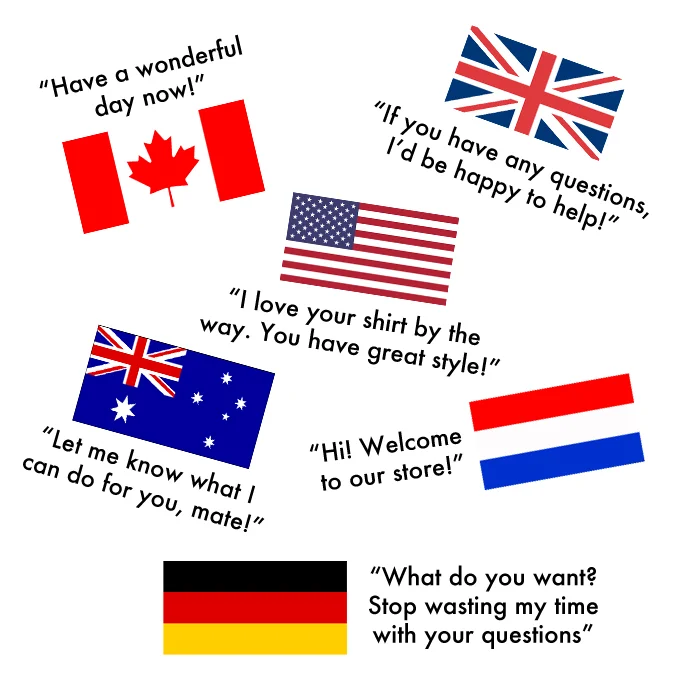The Myth of German Impoliteness
As an English and communication trainer, at least once per day, someone will ask about politeness. Sometimes it’s the phrasing of an email or how to deliver feedback to a colleague, often it’s just the question “Is that the polite way to say it?”. Everywhere I go, the question follows and of all the nationalities I train, the Germans are the most desperate to understand politeness. Many Germans seem to have an inherent fear of appearing impolite in English, they are certain that this is their major communication challenge. German colleagues often assume my nationality (British) makes me the final arbiter on all matters of politeness and etiquette. As I’m often reminded, the British are very polite, at least in comparison to the Germans.
Why is it that Germans consider themselves so impolite, while the British are considered the paragons of civility? Well, at least in Germany, the British seem to have the better PR. Germans may experience Britain through small interactions with British people living or travelling in Germany, but by far the widest British contact is through German media portrayals of the British. I imagine the perception of polite British people is hard to dislodge if all you know is James Bond, Rosamunde Pilcher, the Queen, and Dinner for One. On the other hand, English teaching in Germany often emphasises politeness over all other aspects of English language communication, other than grammar. If my experience with older Germans is anything to go by, much of the focus of this politeness revolves around where in the sentence to put “please” or “thank you”.
For their own part, British and the English-speaking international community are reluctant to challenge the narrative of polite English speakers and impolite Germans. Search any expat blog about Germany and you will inevitably come to an article concerning the rudeness of Germans. Sometimes the question is “Why are Germans so direct?”, which touches on the larger question of communication cultures, or they attempt to explain why German people seem so cold or aloof. Popular opinion online seems to be that Germans are culturally preprogrammed to be impolite, especially to people who are perceived to be outsiders. Alternatively, there are those blogs and forums that discuss, with amazement, how friendly the Germans are and how the Germans they have met don’t conform to the impolite German stereotype.
Language is clearly a major factor, and it is no secret that German is more direct than English. Due to the indirect nature of English language culture, it has developed many friendly phrases that sound wonderful to the ears of German native speakers. One of the major challenges I’ve faced learning German is to realise that I can’t force German to conform to my personal comfort zone of indirect speech. This can be a disorientating experience, just as it must be for the English learner in Germany trying desperately to get to the point while maintaining some fabled concept of politeness. What no one seems to point out is that one of the major elements of English is the ability to sound polite, while at the same time not actually being polite.
When people complain about German impoliteness, they will often point to a particular interaction, usually in the context of customer service. The trope is that German customer service is terrible, shop workers are sometimes rude or actively belligerent. I worked in UK retail for almost a decade. Our mindsets were, and I can’t stress this enough, the same as the retail workers of Germany. However, our rudeness was masked by tone of voice, word choice and communication strategies. Customer service is a world of passive aggression. I can say “certainly, would you like a hand with your packing?” in a hundred different ways, only one of which is sincere. British communication is inherently dishonest, because we can manipulate the tone so subtly. The question seems to be: do you want polite rudeness or straight forward rudeness? In addition, we can use friendliness as a communicative blunt instrument to beat the belligerence out of an interlocutor. The most effective communication skill I found working in retail was the “kill them with kindness” approach of becoming more polite and attentive the angrier a customer became. This may be an active concept in Germany, but not one I often see in the wild.
Ultimately, the question of politeness is closely connected to our cultural expectations. For example, I went to the bakery about a month ago, looking to buy some breakfast bread for my wife. In German, I asked the cashier if she could suggest a suitable type. The lady behind the counter patiently waited for my sub-par German sentence to eventually creak to an end and then proceeded to explain the many varieties of bread that she had, settling on a Volkorn loaf topped with seeds. I thanked her for the useful information and then asked if I could have one of those. She looked at me, shrugged and said “Sorry, we don’t have any of them left”.
My first reaction was to get annoyed at what some might say is a typical German customer experience. However, the expectations of our interaction, my question and her answer, were on totally different planes of existence. I thought my question was clear, due to the context, and that I was expecting her to list off all the bread options she had. Her answer was to tell me about all types of bread, not simply the ones in stock, in order to meet my assumed need for a comprehensive answer. She was giving me a well-informed reply, based on all possible options. I wanted a suggestion based on what was available. I could easily have just put this down to rude and unhelpful Germans and left the bakery empty handed, but do we need to apportion blame here?
Different expectations, our own cultural baggage, and stereotypes can easily derail communication. For a long time I believed Germans to be rude and impolite, because they didn’t conform to my cultural understanding of politeness. Can Germans still be rude and abrasive? Yes, sometimes, but no more than in any other country. Having lived here, I better appreciate the differences in politeness culture, as well as the need to adjust my own expectations. Walk into any waiting room in Germany and people will greet you with a friendly hello, people frequently give up their seats on public transport for older or infirm passengers and when people say “thank you” (Danke), the response “you’re welcome” (Bitte) is not far behind. Germany is politer than you might think, you just need to know what to look for.
Image Credit









